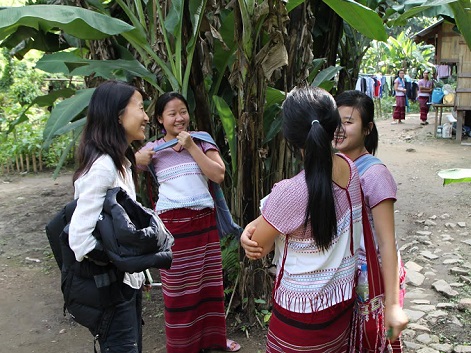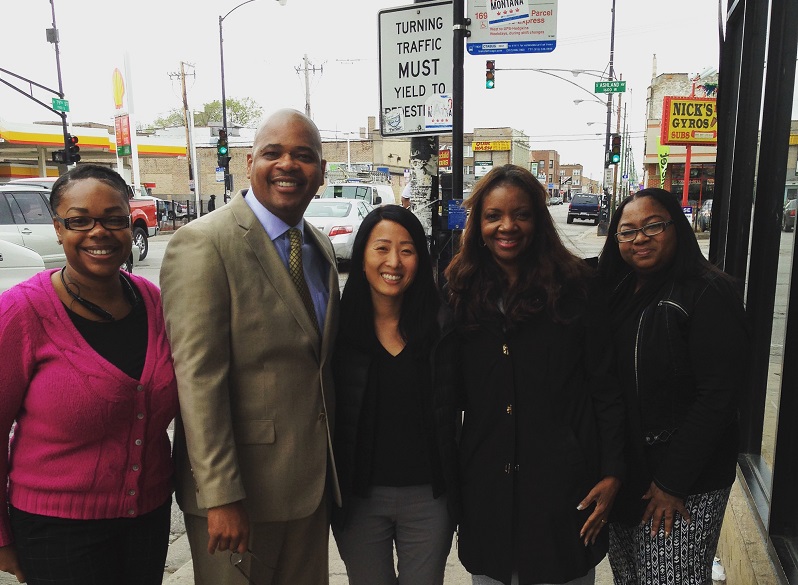After graduating from the University of Washington, I backpacked around the world and ended up teaching English in a refugee camp with 45,000 people along the Thailand-Myanmar (Burma) border. Despite losing their homes and sometimes even family members, the students wanted an education to help rebuild their country. Their stories of courage and resilience in the midst of brutal oppression inspired me.
I came back to Seattle to complete my graduate studies, then returned to eastern Myanmar to start Slingshot Development Fund, a nonprofit organization to support the Karen, Mon, Tavoyan and Burmese ethnic groups. Each had its own language, culture and unique history, but all were slowly being decimated by the world’s longest running civil war and a brutal military dictatorship.

For seven years, we quietly seeded new initiatives by courageous and committed local leaders to help build a local grassroots infrastructure: funding indigenous research to document the wealth of their forests and rivers before it was polluted by mining companies; funding water pipes for communities whose water sources were several miles from their village (communities were often relocated due to the civil war and had no choice where they were placed); and funding for the mobilization and empowerment of villagers to stop the destruction of their old growth forests for palm oil plantations.
In the face of overwhelming odds, a troubling question sometimes arose: What’s the point? The problems and players were so big — corrupt governments, business interests, and even well-intentioned foreigners — and the resources available felt like a drop in the ocean. It forced us to realize we needed to change our way of thinking. We began to focus on the process rather than the outcome. Brutal regimes and corrupt government officials could be in power for years before change occurs — but the individuals and communities who are educated, empowered, transformed and connected, will endure. Maybe each system of oppression can be leveraged and seen as a tool for community empowerment?
Changing our Grantmaking Approach
An approach like this to grantmaking creates a shift in the relationship with grantees and raises several questions related to metrics, evaluation and power dynamics. How do you measure the growth of the human spirit and the empowerment of formerly isolated and frightened communities? What numbers can quantify this, when so much of the work is relational and transformational, rather than transactional? How do you flip the dynamic so that communities can set their own processes and agendas on the issues that matter most to them, rather than dictating those initiatives from the funding side?
One of the reasons I moved back to the U.S. last year was to learn how to support bottom-up organizing and leadership development on a larger scale; to learn how to be a better advocate for grassroots funding. Through Philanthropy Northwest's Momentum Fellowship, I was drawn to Marguerite Casey Foundation because of its philosophy to ask, listen — and then act. Because foundation leaders listened to nonprofits and low-income families when they crafted their grantmaking strategy, the foundation provides long-term, general support grants to cornerstone organizations working on building movements. Rather than imposing strict guidelines for grantees, ouremphasis is on building the capacity of low-income families to identify and create their own solutions. This also ties into the diversity, equity and inclusion focus of the Momentum Fellowship: DEI is not just about numbers, it’s about representation so that communities who are under-represented and marginalized can be heard at the decision-making tables.

I am learning a tremendous amount about the grassroots organizing infrastructure across the United States as Marguerite Casey Foundation's program fellow for the Midwest and Upper South region. Similar to what I experienced in southeast Asia, grassroots organizations in rural America are seriously underfunded, yet staffed by some of the most committed and courageous people I’ve met.
A study by the National Committee for Responsible Philanthropy shows that every dollar grantmakers invest in policy and civic engagement work provides a return of $115 in community benefit. At the recent Appalachian Funders Conference in Central Appalachia, where communities dependent on coal are in serious economic distress due to the decades-long collapse of the coal economy, we discussed how foundation grant funding falls short of what communities need for economic transition. However, grants can be strategically leveraged to build capacity for communities to absorb federal funds, to help them have a strong ongoing presence at decision-making tables. Without this strategic investment of grants, federal funding might end up directed to projects that lack local ownership — creating dependency, rather than agency.
Funding for grassroots organizing and movement building is not easily understood, as shown by the small amount given to this critical work. It’s not to say that direct services are unimportant, but that funding for organizing and movement building could be seen as a strategic and essential complement. My vision is to be a part of a movement in philanthropy that supports organizing and systems change as led by those most affected, now as a Momentum Fellow and in the future, as a leader in philanthropic organizations supporting community-driven initiatives.
Janelle Choi is a Momentum Fellow hosted by Marguerite Casey Foundation. Read more about the Momentum Fellowship on our website, including monthly blog posts from our first cohort.
Comments
As COO of Westside Health
As COO of Westside Health Authority, located in the Austin neighborhood on the far westside of Chicago, I can tell you that this is the best way to provide sustainable impact to communities. Direct services are vital, however, without providing grassroots efforts to build relationships among people any effort for true revitalization is in vain. Thank you MCF for all you do and for "getting it"!
Great post on how the only
Great post on how the only people who build a vibrant and resilient community are the ones who live there. Nebraska Community Foundation is doing great things in helping small rural communities across our state to use the tools of philanthropy to build the hometowns of their dreams. Local volunteers raise all the funds and make the decisions on where to invest them. More at nebcommgound.org. We'd enjoy sharing more.